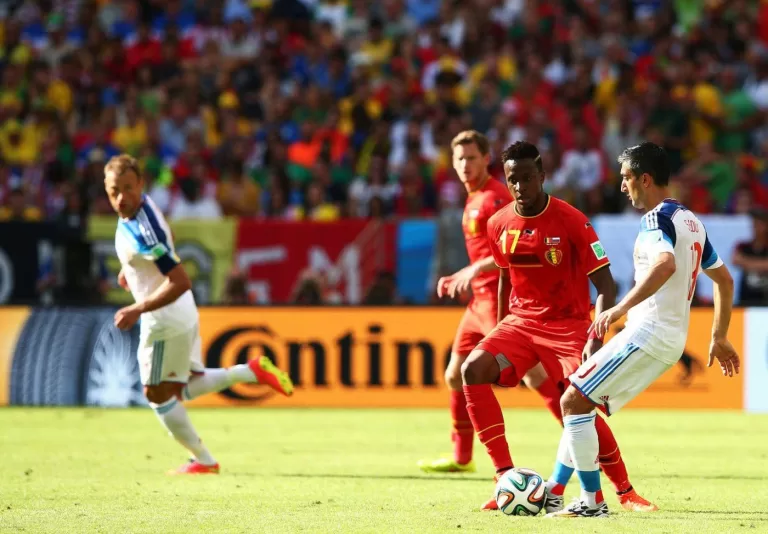A multitude of stars are on offer at the World Cup, both on and off the pitch…
With the likes of Leo Messi and Cristiano Ronaldo taking centre-stage at the World Cup, the men in charge usually get the short end of the stick. However, the manager’s team selections and tactics are just as integral to his side’s success (or lack thereof) as the performances of their star players.
10. Juan Carlos Osorio (Mexico)
Mexico’s first-ever Colombian boss, Juan Carlos Osorio, does not have the highest of profiles compared to others but he has had three years to get to know his team and prepare them for this tournament – with results that show progress during that time. After taking over in late 2015, he led his team to a 16-match unbeaten run, finishing top of their World Cup qualification group for the first time since 1998.
Before taking over the Mexican national team, Osorio enjoyed a journeyman career in management, managing various Colombian clubs, as well as Puebla in Mexico and Chicago Fire and NY Red Bulls in the USA, with whom he won the Western Conference in 2008 before losing in the MLS Cup final. Osorio will not be continuing in his role as Mexico boss post-World Cup.
9. Zlatko Dalic (Croatia)
Croatian boss Zlatko Dalic left his comfort zone to make a name for himself in the Middle East, managing clubs in Saudi Arabia and the UAE. He was named coach of the year in Saudi in 2011, beating off competition from more high-profile managers like Walter Zenga and Eric Gerets. In 2013, he turned down an offer to become the sporting director at Hajduk Split, Croatia’s biggest club. In the UAE, he again won the coach of the year award in 2014 and 2015, continuing his meteoric rise. In 2016, he unfortunately lost in the Asian Champions League final to Korean outfit Jeonbuk Motors.
In less than two years, he made Al Ain of UAE one of the top clubs of Asia before taking over his country’s national team hot-seat in 2017, bringing with him iconic former Croatian striker Ivica Olic as assistant manager. Croatia are in the proverbial group of death with tournament-favourites Argentina and highly-regarded sides in Iceland and Nigeria. They will have to do well to go deep in the tournament.
Jorge Sampaoli is certainly blessed with an abundance of atttacking power, but who should start up front for Argentina at the 2018 #WorldCup?
Read @BenMcAleer1's article now — https://t.co/SrgAMHvJqz pic.twitter.com/5YeK1tTWRw
— WhoScored.com (@WhoScored) April 26, 2018
8. Jorge Sampaoli (Argentina)
Sampaoli has finally taken over the national team of his home country after years of managing clubs around South America as well as leading Chile to the 2015 Copa America. In that tournament’s final, Sampaoli got the better of his country of birth, Argentina, handing Chile their first ever Copa America triumph and Argentinean fans will be glad he is on their side this time around.
Jorge also managed Sevilla for the 2016/17 season and masterminded the Andalusians’ 2-1 victory over Real Madrid, ending their rivals’ 40-match unbeaten streak in all competitions. In pursuit of Argentina’s first World Cup since 1986, Sampaoli has named the oldest World Cup squad in the country’s history.
7. Bert van Marwijk (Australia)
Dutchman Bert van Marwijk comes with a proven tournament pedigree, having led his native Dutch side to the final in 2010. Van Marwijk has also enjoyed a highly successful and journeyed career in management, winning the old UEFA Cup in 2002 with Feyenoord along with other stints at top-tier clubs such as Hamburg and Borussia Dortmund.
He was set to be at the helm of Saudi Arabia at this World Cup before the two parted ways after sealing qualification with a win over Japan. Admittedly, van Marwijk hasn’t had as much time as he would’ve liked with his new team, only taking over in January, and Australia would do very well to get out of their group of France, Denmark, and Peru.
6. Shin Tae-yong (South Korea)
Nicknamed the ‘Asian Mourinho’ by journalist John Duerden, Shin Tae-yong has had to work his way to the top job in Korean football. Initially learning his craft as assistant manager at Australian club Queensland Roar, Shin started his senior managerial career at Seongnam Ilhwa Chunma in 2008, winning the Asian Champions League with them in 2010.
Since 2016, he had been working with the Korean youth teams, managing the U-23s and U-20s. He is one of the relatively younger managers at the World Cup at 49 and should have a bright future ahead of him.
